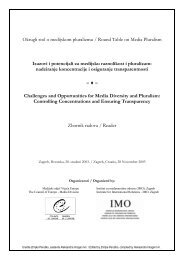almanac on security sector oversight in the Western Balkans
almanac on security sector oversight in the Western Balkans
almanac on security sector oversight in the Western Balkans
Create successful ePaper yourself
Turn your PDF publications into a flip-book with our unique Google optimized e-Paper software.
The emergence of new actors permanently eroded <strong>the</strong> <strong>security</strong> m<strong>on</strong>opoly and exclusivity<br />
of <strong>the</strong> traditi<strong>on</strong>al <strong>security</strong> forces. Parallel with this, a shift of nati<strong>on</strong>al <strong>security</strong><br />
from <strong>the</strong> high politics doma<strong>in</strong> to <strong>the</strong> public policy doma<strong>in</strong> began. Today, <strong>on</strong>ly parliament<br />
has <strong>the</strong> competencies to def<strong>in</strong>e nati<strong>on</strong>al <strong>security</strong> strategy <strong>in</strong> <strong>Western</strong> Balkan<br />
countries, and executive bodies are obliged to draw up<strong>on</strong> those strategies <strong>in</strong> order<br />
to create and implement <strong>the</strong> current <strong>security</strong> policy. To achieve this, a clear cha<strong>in</strong> of<br />
civilian command was established <strong>in</strong> <strong>the</strong>se countries (Annex, Table 5). The l<strong>in</strong>es of<br />
<strong>in</strong>tegrated and coord<strong>in</strong>ated management of <strong>the</strong> state <strong>security</strong> <strong>in</strong>stituti<strong>on</strong>s were simultaneously<br />
developed. Professi<strong>on</strong>al aut<strong>on</strong>omy of <strong>the</strong> military, police and <strong>in</strong>telligence<br />
services was formally secured and streng<strong>the</strong>ned. 206 Civilian supremacy <strong>in</strong> governance<br />
was also streng<strong>the</strong>ned, ow<strong>in</strong>g to a gradual <strong>in</strong>clusi<strong>on</strong> of n<strong>on</strong>-uniformed experts <strong>in</strong><br />
relevant m<strong>in</strong>istries. This partly limited <strong>the</strong> <strong>in</strong>fluence of <strong>the</strong> <strong>security</strong> elites’ corporate<br />
<strong>in</strong>terests <strong>on</strong> governance. This is also <strong>the</strong> goal of professi<strong>on</strong>alisati<strong>on</strong> of public adm<strong>in</strong>istrati<strong>on</strong>s,<br />
aimed at limit<strong>in</strong>g <strong>the</strong> <strong>in</strong>fluence of <strong>the</strong> political class <strong>on</strong> <strong>the</strong> governance of <strong>the</strong><br />
<strong>security</strong> <strong>sector</strong>. It can be justifiably c<strong>on</strong>cluded that executive actors <strong>in</strong> <strong>the</strong> regi<strong>on</strong> now<br />
possess all necessary authorities and means for strict c<strong>on</strong>trol of <strong>the</strong> state <strong>security</strong> forces.<br />
It is far more important that this form of c<strong>on</strong>trol, unlike <strong>the</strong> <strong>in</strong>herited authoritarian<br />
model, is now based, at least declaratively, <strong>on</strong> democratic procedures and precepts. All<br />
leaders and executives are bound by law to work transparently and to be available to<br />
<strong>the</strong> public, <strong>in</strong> accordance with legal provisi<strong>on</strong>s <strong>on</strong> c<strong>on</strong>fidentiality.<br />
The ma<strong>in</strong> supporter of democratic governance comes from <strong>the</strong> fact that <strong>security</strong> <strong>sector</strong><br />
governance regimes have now become ra<strong>the</strong>r complex, ow<strong>in</strong>g to an <strong>in</strong>creased number<br />
of actors as well as adm<strong>in</strong>istrative and command reforms. The establishment of bodies<br />
and procedures for <strong>in</strong>ternal c<strong>on</strong>trol of each <strong>security</strong> <strong>in</strong>stituti<strong>on</strong> is an additi<strong>on</strong>al check.<br />
Evaluati<strong>on</strong> and assessment of <strong>the</strong> read<strong>in</strong>ess and capacity of <strong>the</strong> units and members of<br />
a given <strong>in</strong>stituti<strong>on</strong> is am<strong>on</strong>g <strong>the</strong> key competencies of <strong>in</strong>ternal c<strong>on</strong>trol bodies. They are<br />
authorised to c<strong>on</strong>trol <strong>the</strong> legality of <strong>security</strong> forces’ work, <strong>in</strong>clud<strong>in</strong>g budget spend<strong>in</strong>g.<br />
In additi<strong>on</strong>, <strong>on</strong>e duty of <strong>in</strong>ternal c<strong>on</strong>trol bodies is to systematically m<strong>on</strong>itor whe<strong>the</strong>r<br />
<strong>the</strong> <strong>security</strong> <strong>in</strong>stituti<strong>on</strong>s respect human rights of <strong>the</strong> public and of <strong>the</strong>ir own pers<strong>on</strong>nel.<br />
Managerial and command competencies <strong>in</strong> <strong>the</strong> <strong>Western</strong> <strong>Balkans</strong> countries are distributed<br />
am<strong>on</strong>g different bodies and <strong>in</strong>stituti<strong>on</strong>s of <strong>the</strong> executive branch. For example, a<br />
country’s m<strong>in</strong>istry of f<strong>in</strong>ance has an obligati<strong>on</strong> to systematically c<strong>on</strong>trol f<strong>in</strong>ancial management<br />
<strong>in</strong> <strong>the</strong> statutory <strong>security</strong> <strong>sector</strong>. This is additi<strong>on</strong>al proof that systemic dec<strong>on</strong>centrati<strong>on</strong>,<br />
redistributi<strong>on</strong> and restricti<strong>on</strong> of <strong>security</strong> power has been undertaken. This<br />
dangerous power is thus no l<strong>on</strong>ger solely <strong>in</strong> <strong>the</strong> hands of a s<strong>in</strong>gle state leader or rul<strong>in</strong>g<br />
group. Local <strong>security</strong> services can no l<strong>on</strong>ger apply special measures without a court’s<br />
written c<strong>on</strong>sent. It can be safely assumed that <strong>the</strong> danger of arbitrary – external or<br />
<strong>in</strong>ternal – abuse of state <strong>security</strong> forces has been largely removed <strong>in</strong> <strong>the</strong> regi<strong>on</strong>.<br />
In order to prevent a situati<strong>on</strong> <strong>in</strong> which all decisi<strong>on</strong>-mak<strong>in</strong>g would depend <strong>on</strong> <strong>the</strong><br />
power and will<strong>in</strong>gness or unwill<strong>in</strong>gness of <strong>the</strong> current adm<strong>in</strong>istrati<strong>on</strong>, and <strong>on</strong> <strong>the</strong> ex-<br />
206 It was for this purpose that <strong>the</strong> positi<strong>on</strong> of <strong>the</strong> director was <strong>in</strong>troduced, who is selected through<br />
open competiti<strong>on</strong>.<br />
224



